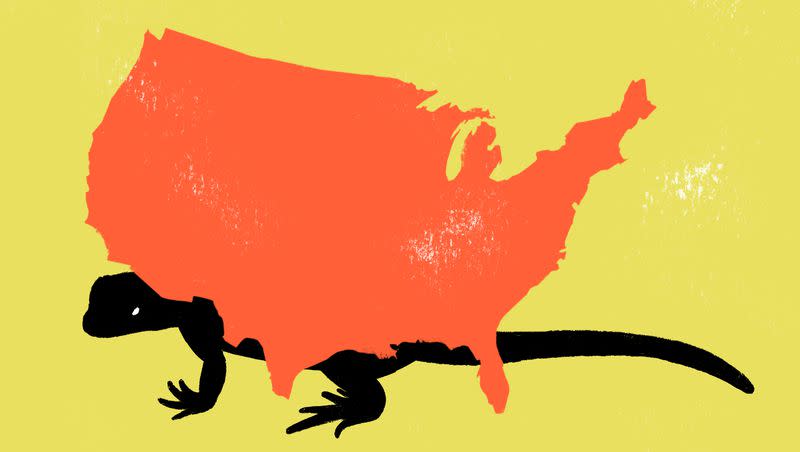Quieting the lizard

Editor’s note: This story is part of Deseret Magazine’s January/February double issue addressing political polarization.
We all have a lizard part of our brain. It’s called the amygdala. The amygdala doesn’t reason. It’s not rational. When the lizard part of the brain is active, the prefrontal cortex goes offline. It’s not in control anymore. The lizard part of the mind feeds anger. When activated, the lizard part of the brain encourages me to attack.
We have to quiet the lizard part of our brain, but we also have to learn to speak its language. The lizard speaks the language of metaphors. Like a child, the lizard needs to be reassured and it needs to be heard. If a child is afraid, it doesn’t help to say, don’t be afraid. They need to be validated. They need to be heard. They need to be seen.’
Related
Social scientists say we’re living in the worst political climate in the United States since the Civil War. And much of that climate is driven by fear, and that fear is based on the fact we live in a time of great change. There are fears about a changing climate. There are fears about artificial intelligence and other technological changes. There are fears about changes to the global economy. But the change that seems to be triggering the most fear is demographics. We’re seeing this happen all over the world. Populations in some countries are aging, and immigrants are moving in to replace the workforce. It’s happening here too. Our nation is becoming more diverse. Places like Salt Lake City are becoming more diverse. There are Black people, brown people, Asian people moving to Salt Lake. Some will convert to The Church of Jesus Christ of Latter-day Saints. Some will not. What will that mean? Would those who have been here a long time feel like they still belong? Will those who come here feel like they belong? This causes anxiety. It causes fear. We have to recognize this reality, because fear is our base emotion. It’s our first emotion. So it’s very easy to activate. It’s the lizard part of the brain.
We all belong to this earth. We all belong to this country. And we all belong together.
When we see our communities changing, what’s the story we’re going to tell to process those changes? Can we make the story about belonging? In this very vitriolic, fractured world, it may sound naive to talk about love and belonging, but that’s exactly what we need to talk about.
The South African Zulu word is sabana suburbano, which means the God in me sees the God in you. It doesn’t mean that you don’t have bad parts. It doesn’t mean you don’t get angry. It doesn’t mean you can’t be flawed. But you still carry that divine. And I recognize that in everyone, even the so-called others. They also carry the divine.
With elections, we need to get beyond just winning and losing. I’m not saying elections aren’t important, or that policies aren’t important. They are, and in that sense winning is important. But what do we do the day after the election? What do we do with the 49 percent who didn’t win? We have to go beyond winning and losing and realize the story we tell about ourselves needs to be about love, and it needs to be about belonging. We all belong to this earth. We all belong to this country. And we all belong together. It can’t be about one community against another. It’s got to be our community. How do we tell the story about that and how do we make it real? If we don’t figure that out, I think we’re probably toast.
john a. powell is a law professor and a professor of African American studies and ethnic studies at the University of California, Berkeley and the director of the Othering and Belonging Institute.
This story appears in the January/February 2024 issue of Deseret Magazine. Learn more about how to subscribe.

